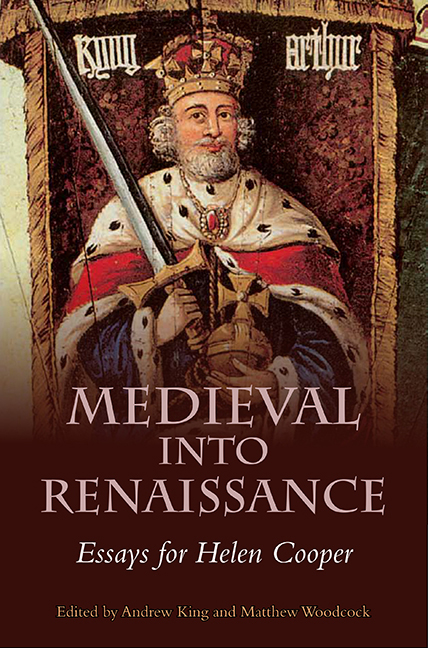Book contents
- Frontmatter
- Contents
- List of Illustrations
- List of Contributors
- Acknowledgments
- Abbreviations
- Introduction
- Unknowe, unkow, Vncovthe, uncouth: From Chaucer and Gower to Spenser and Milton
- Armour that doesn't work: An Anti-meme in Medieval and Renaissance Romance
- ‘Of his ffader spak he no thing’: Family Resemblance and Anxiety of Influence in Fifteenth-Century Prose Romance
- Writing Westwards: Medieval English Romances and their Early Modern Irish Audiences
- Penitential Romance after the Reformation
- The English Laureate in Time: John Skelton's Garland of Laurel
- Thomas Churchyard and the Medieval Complaint Tradition
- Placing Arcadia
- Fathers, Sons and Surrogates: Fatherly Advice in Hamlet
- ‘To visit the sick court’: Misogyny as Disease in Swetnam the Woman-Hater
- The Monument of Uncertainty: Sovereign and Literary Authority in Samuel Sheppard's The Faerie King
- Mopsa's Arcadia: Choice Flowers Gathered out of Sir Philip Sidney's Rare Garden into Eighteenth-Century Chapbooks
- Bibliography
- Index
- A Bibliography of Helen Cooper's Published Works
- Tabula Gratulatoria
Armour that doesn't work: An Anti-meme in Medieval and Renaissance Romance
Published online by Cambridge University Press: 05 July 2016
- Frontmatter
- Contents
- List of Illustrations
- List of Contributors
- Acknowledgments
- Abbreviations
- Introduction
- Unknowe, unkow, Vncovthe, uncouth: From Chaucer and Gower to Spenser and Milton
- Armour that doesn't work: An Anti-meme in Medieval and Renaissance Romance
- ‘Of his ffader spak he no thing’: Family Resemblance and Anxiety of Influence in Fifteenth-Century Prose Romance
- Writing Westwards: Medieval English Romances and their Early Modern Irish Audiences
- Penitential Romance after the Reformation
- The English Laureate in Time: John Skelton's Garland of Laurel
- Thomas Churchyard and the Medieval Complaint Tradition
- Placing Arcadia
- Fathers, Sons and Surrogates: Fatherly Advice in Hamlet
- ‘To visit the sick court’: Misogyny as Disease in Swetnam the Woman-Hater
- The Monument of Uncertainty: Sovereign and Literary Authority in Samuel Sheppard's The Faerie King
- Mopsa's Arcadia: Choice Flowers Gathered out of Sir Philip Sidney's Rare Garden into Eighteenth-Century Chapbooks
- Bibliography
- Index
- A Bibliography of Helen Cooper's Published Works
- Tabula Gratulatoria
Summary
One of Helen Cooper's finest essays concerns the function of magic that doesn't work in medieval and Renaissance romance. Bringing together her impish sense of humour, her astonishing range of reading and her infectious delight in tracing the mutations of genre in response to cultural change, the essay is a scholarly tour de force, perhaps the most memorable chapter in her celebrated monograph The English Romance in Time. It is particularly suggestive where it draws attention to the moments in medieval romance when the presence of magic serves to focus the reader's attention on some peculiarly human quality: on selfless love, for instance, as when the imperilled teenage lovers Floris and Blancheflour compete over which of them will bestow on the other the magic ring which is said to preserve its owner's life; or on stubborn courage, as when an anonymous lover in a tale by Marie de France refuses to drink the magic potion that would help him carry his beloved up a mountain, an act of heroic obstinacy that kills them both. The chapter is not about a ‘meme’, Cooper explains – an idea or theme that survives from generation to generation, mutating in response to the changing pressures of the times. Instead it concerns what she calls a ‘meme that got out of hand’, that of the magical object. All too easily magic can get boring, operating in too predictable a fashion, providing too easy an escape route from a tricky situation. The magic that doesn't work revitalizes the magical narrative by introducing a crucial element of surprise, disorder, or emotional crisis; and as such it resists replication, since the whole point of it (when well used) is to unsettle the romance reader's expectations.
I would like to consider in this essay another recurring theme that has given us some of the most striking passages in medieval and Renaissance romance: that of armour that doesn't work. For a modern reader, armour is the ultimate emblem of chivalric romance, especially the full plate armour of the fifteenth and sixteenth centuries, as fetishized in the paintings of John William Waterhouse, John Boorman's film Excalibur, or the BBC TV series Merlin. For the late medieval reader, too, armour or harness that worked was romance incarnate.
- Type
- Chapter
- Information
- Medieval into RenaissanceEssays for Helen Cooper, pp. 35 - 54Publisher: Boydell & BrewerPrint publication year: 2016

